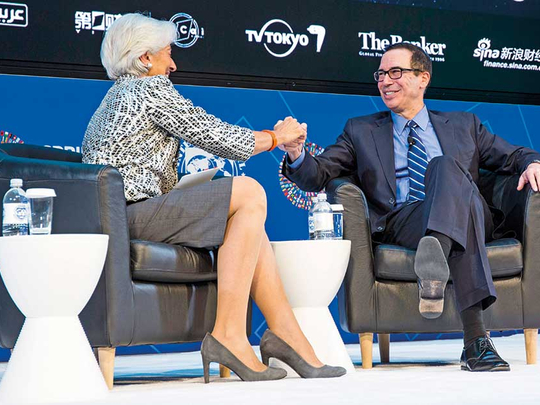
Washington: Donald Trump’s America First doesn’t necessarily leave the global economy last.
After three months of agonising by policymakers over what the US president’s combative policy stance would mean for trade and economic stability in the rest of the world, Treasury Secretary Steven Mnuchin is now sending a reassuring message to his counterparts: What works for us can help you too.
“Sustained US economic growth is good for global growth,” Mnuchin said Saturday during a discussion with International Monetary Fund Managing Director Christine Lagarde in Washington. “If we can grow the US economy, that’s not just good for the US worker, that’s good for international growth and it creates opportunities. So that’s what we’re focused on, and if we do a good job, that can carry over in the spillover.”
That’s a new tone for an administration which has pledged to rebalance global commerce in its favour, repatriate American manufacturing jobs and right the wrongs it sees as emanating from the current World Trade Organisation-centred system. And facing political risks to business confidence and output in Europe and Asia, global finance chiefs attending the IMF and World Bank spring meetings in Washington this week were ready to smooth over conflicts with the leaders of the world’s largest economy.
Free, Fair
“Everybody is in line that we need free and fair trade,” Mexican central bank governor Agustin Carstens said in Washington on Saturday. He echoed Italian Finance Minister Pier Carlo Padoan, who put differences over trade barriers that just a month ago stymied a Group of 20 meeting in Germany down to a matter of linguistics.
The IMF’s steering committee adopted the position on trade taken by the G-20 last month in an effort to accommodate the US, which is considering how far to go in fulfilling the president’s campaign pledges to impose tariffs and reshape international accords. That meant that a previous commitment to avoid “all forms of protectionism” was excised from the group’s common statement. Still, that doesn’t mean America and the rest of the world are on a collision course, according to Padoan.
“I can assure everybody that at the meetings we had these past days, the general mood is that there is no way protectionism should increase, and this attitude may be with different nuances in the language shared by all members,” he said at a press briefing.
Reciprocal Deals
Mnuchin channelled Trump’s intentions on trade, and joked about the number of bilateral meetings he’s had in the two international policy meetings he’s attended since taking office.
“The president believes in reciprocal trade deals, and reciprocal free trade,” he said. “If our markets are open, there should be a reciprocal nature to other people’s markets.”
Mnuchin’s first foray into global policymaking last month in Baden-Baden, Germany, was marked by an inability to agree on trade language. Now, he said, he feels “much more comfortable” in his new role.
Still, while delegates at the IMF expressed less concern about the Trump administration’s intentions, a few said there’s still no clear direction. A mooted border-adjustment tax that raised greatest alarm among global partners hasn’t been fleshed out yet, and a probe into steel imports announced this week could yet raise tensions with China, the world’s biggest producer of the metal.
“I don’t think it’s clear to anyone at this point” what trade policies Trump will pursue, Philippine central bank governor Amando Tetangco said. France’s Michel Sapin also pleaded for more clarity.
“We’re hoping they’ll move in a rational manner from slogans to arguments and from arguments to decisions that will allow us to see where the American government wants to go,” he said.
French Elections
Political risks to the global economy still loom elsewhere, most immediately in France where the first round of a presidential election takes place on Sunday. The prospect of anti-euro candidate Marine Le Pen advancing into the second round prompted European Central Bank officials to sound reassuring noises on their readiness to soothe potential market turmoil.
“The central bank should be ready for any shocks that should materialise,” Governing Council member Ignazio Visco said at a press conference Saturday.
After a year in which the world was rocked by the U.K.’s decision to leave the European Union and Trump’s election, some delegates are trying to focus on what’s actually an improving global economy — even as it still faces risks including conflict on the Korean peninsula or a fragmentation of the euro.
“We hope that this is the beginning of a new growth cycle,” Australian Finance Minister Mathias Cormann said in an interview in Washington. “It’s early days in terms of the US administration.”












